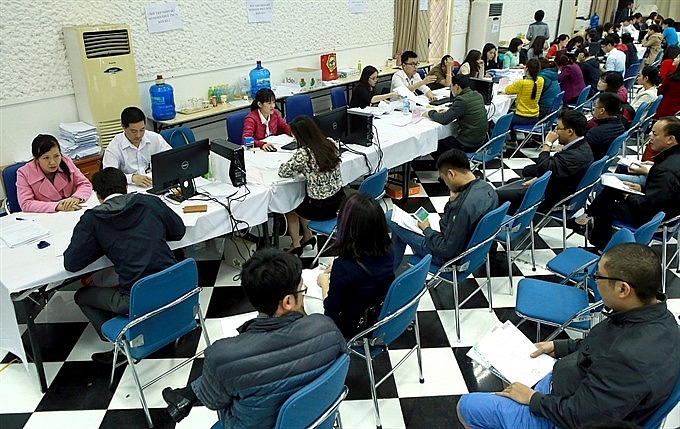Government committed to slash business costs
 |
| People wait for their turn to complete tax procedures at the Hà Nội Tax Department. |
The efforts aim at improving competitiveness and sustaining socio-economic achievements made last year, said Prime Minister Nguyễn Xuân Phúc in an official response to queries from Hà Nội’s National Assembly deputies.
In a resolution made on January 1, the Government listed major tasks and solutions to implement socio-economic development plan in 2018.
They include, firstly, reforming administrative procedures related to land, taxation, customs, agriculture, rural areas, information technology applications and start-ups.
Secondly, making robust changes to the business environment to enhance competitiveness - and to regularly hold dialogues with enterprises to seek feedback.
Thirdly, taking drastic measures to develop enterprises, promote innovation and start-ups; continue perfecting mechanisms and policies on business investment, support small and medium-sized enterprises, co-operatives and house-hold enterprises; and creating a fair environment.
The PM also reiterated that the Vietnamese government has for long recognised the need for enhancing ties between domestic enterprises and FDI enterprises, evidenced by Resolution No 103/NQ-CP issued in 2013 delineating guidelines for attracting, using, and managing of foreign investment.
The Government wants to make sure that the success of FDI enterprises, cited as the driver of growth for the Vietnamese economy, will cause a positive chain reaction, raising competitiveness and the capacity of domestic enterprises.
According to the Government, there have been promising gains made from ties between FDI enterprises and domestic companies. Some FDI enterprises have put in place plans to co-operate and support Vietnamese enterprises to develop supporting industries.
On the other hand, he said, Vietnamese enterprises had proved capable of entering the value chain of big name multi-nationals like Samsung and LG. In 2014, there were only four Vietnamese suppliers to Samsung, now there have been 29 direct suppliers and still counting.
According to the latest Provincial Competitiveness Index (PCI) for 2016, 14 per cent of private enterprises have FDI customers operating in Việt Nam. Statistics show that at least 26.6 per cent of FDI enterprises’ input was produced and purchased in Việt Nam.
PM Phúc noted that these figures signify positive improvements in the co-operation between FDI and domestic enterprises over time, however, they “could be higher”.
He said one of the chief reasons for this result could be weak implementation of the Government’s policies. Domestic enterprises showed insufficient efforts to upgrade their infrastructure, technology, and improve their capacity to produce higher quality products and services.
In addition to attracting investment from multinational corporations, the PM said attention should also be paid to pulling in competitive suppliers who could join the production chain and create high value-added production in sectors that domestic enterprises were incapable of meeting the demands.
What the stars mean:
★ Poor ★ ★ Promising ★★★ Good ★★★★ Very good ★★★★★ Exceptional
Related Contents
Latest News
More News
- Human-centred governance seen as key to AI development (December 19, 2025 | 18:19)
- TECHFEST Vietnam 2025 links startups with policy and capital (December 15, 2025 | 18:21)
- Long Thanh International Airport welcomes first Vietnam Airlines test flight (December 15, 2025 | 18:01)
- Foreign fruits flood Vietnamese market (December 09, 2025 | 13:22)
- Vietnam’s fruit and vegetable exports reach $7.8 billion in first 11 months (December 05, 2025 | 13:50)
- Vietnam shapes next-generation carbon market (November 26, 2025 | 15:33)
- PM urges Ho Chi Minh City to innovate and remain Vietnam’s economic locomotive (November 26, 2025 | 15:29)
- Experts chart Vietnam's digital finance path: high hopes, high stakes (November 14, 2025 | 10:56)
- Vietnam’s seafood imports surge 30 per cent in first 10 months (November 10, 2025 | 19:35)
- Vietnam’s durian exports hit $1 billion milestone (October 30, 2025 | 17:41)

 Tag:
Tag:




















 Mobile Version
Mobile Version